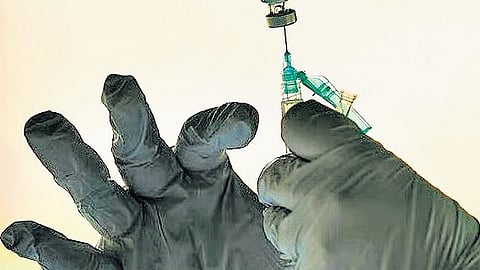

NEW DELHI: A whopping 1.44 million children in India did not receive a single shot of any routine vaccination in 2023, a new global study published Wednesday in The Lancet said.
The study also stated that India recorded the second-highest number of “zero-dose” children—defined as those lacking access to or never reached by routine immunisation services— after Nigeria.
India also stood among the eight countries, along with Nigeria and Ethiopia, where more than half of the unvaccinated children from around the world lived as of 2023, according to an analysis by the Global Burden of Disease Study Vaccine Coverage Collaborators.
The report said that more than half of the 15.7 million global zero-dose children resided in just eight countries, with Nigeria topping the list with the largest number of unvaccinated children (2.5 million), followed by India (1.4 million), the Democratic Republic of Congo (882,000), Ethiopia (782,000), Somalia (710,000), Sudan (627,000), Indonesia (538,000) and Brazil (452,000), thus emphasising “persistent inequities”. In India, the Universal Immunisation Programme provides vaccination against 12 diseases, which are offered to children free of cost.
The report stated that achieving coverage of 90 percent or greater for each of the life-course vaccines — all three doses of the diphtheria-tetanus-pertussis (DTaP) vaccine, two measles vaccines, and the pneumococcal vaccine — is the central target for 2030. Only 18 of 204 countries have already met this target.
It also said that children who had never received a routine childhood vaccine further fell by 75 percent fall, “from 58.8 million in 1980 to 14.7 million in 2019, before the Covid-19”. “The Covid-19 pandemic exacerbated these challenges, with global rates for these vaccines declining sharply since 2020 and still not returning to pre-COVID-19 pandemic levels as of 2023,” it added.
It noted that substantial increases in coverage are necessary in many countries and territories, with those in sub-Saharan Africa and south Asia facing the greatest challenges.
The study suggested strengthening primary healthcare systems, addressing vaccine misinformation and hesitancy, and adapting to local contexts as essential to advancing coverage. The report said that measles vaccination coverage declined in 100 of 204 countries between 2010 and 2019.
In 1980, 53.5 percent of children who had never received a routine childhood vaccine, or zero-dose children, lived in just five countries, India, China, Indonesia, Pakistan, and Bangladesh. But by 2019, 52.8 percent of zero-dose children still lived in only seven countries, namely, Nigeria, India, Ethiopia, the Democratic
Republic of the Congo, Brazil, Somalia, and Pakistan, it highlighted.
The report said although delivering routine childhood vaccinations worldwide requires a tremendous investment of global resources, including approximately $3.9 billion in development assistance for health in 2023, childhood immunisation has proven to be one of the most successful and cost-effective public health strategies known, both in terms of lives saved and return on investment.
The study provided updated global, regional, and national estimates of routine childhood vaccine coverage from 1980 to 2023 for 204 countries and territories for 11 vaccine-dose combinations recommended by World Health Organisation for all children globally.